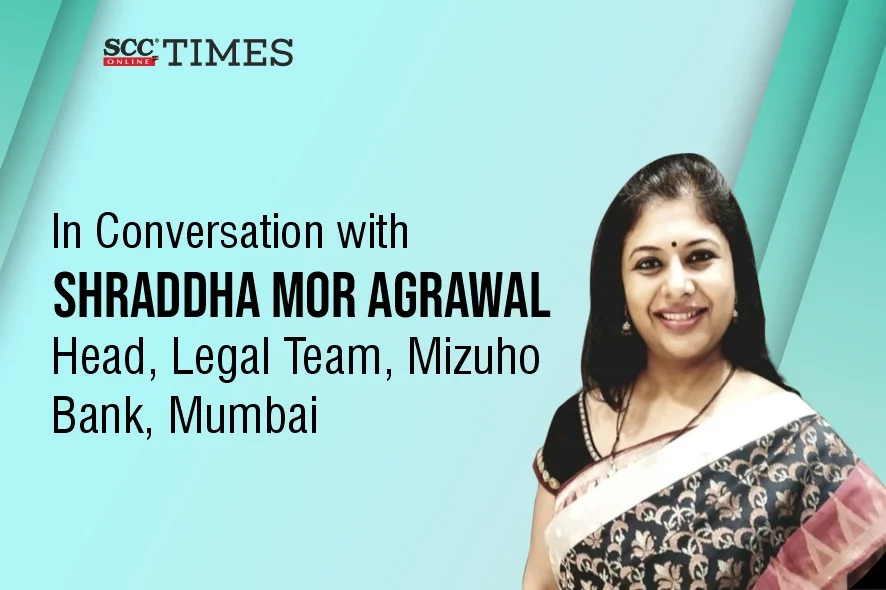1. To begin with, please tell us about yourself and what motivated you to pursue law. Would you also like to share a fun fact about yourself?
Your response: I am based in Mumbai and working as Head of Legal for Mizuho Bank India. I am originally from Kolkata and completed my Bachelor’s from the West Bengal National University of Juridical Sciences in 2006. I worked with the erstwhile Amarchand before joining Mizuho in the year 2015. I have been an avid reader and interested in academics since childhood. The writings of Mr Soli Sorabjee and Mr Arun Jaitley inspired me to think about the Constitution, leading me to delve into Political Science and closely follow politics from a young age. The intersection of politics and law piqued my curiosity to pursue a career in law. Further, my willingness to hone my research and argumentative skills greatly interested me in law.
A fun fact about me would be that I am an avid sports fan and closely follow cricket and football. I love to attend live matches in the stadium with my son whenever the Indian team plays, and I try to keep up with the latest sports news.
2. What internships did you take up during law school and how have they helped you shape your career?
Your response: The internships I undertook comprised Tier 1 law firms, including erstwhile Amarchand, which offered me a pre-placement offer. I have also interned with the current Attorney General of India, Mr R. Venkataramani, and Justice Harish Tandon, Judge at the Calcutta High Court.
These internships helped me gain valuable experience and knowledge in corporate and commercial law and helped shape my career path. I met and learned a lot from various industry peers and other distinguished corporate giants, and I worked closely on major commercial deals in the domains of mergers and acquisitions (M&A), banking and finance regulatory and legal compliance, and legal advisory, among others. These internships provided me with the required expertise and exposure to transverse through the intricacies of the corporate and commercial law field.
3. You have extensive experience in financial transactions and capital markets; how did you develop an interest in this field? Was it always your first choice?
Your response: The development of the Indian Economy in the early ’90s through globalisation and the emergence of new industries resulted in a paradigm shift, followed by the country’s legal and regulatory framework changes. This has always intrigued me and has been an area of interest. The emergence of the new economic policies meant that the corporate and commercial law fields would become an essential area of practice, which is why I am involved in the domain of corporate and commercial laws in particular.
4. How would you describe your transition from working at a law firm to an in-house counsel leading a team? What were the key differences you encountered?
Your response: The transition has been pretty smooth, and my years of experience in a leading law firm dealing with corporate and commercial laws meant that I did not necessarily have to adjust much in my field of practice. I was accustomed to handling a team in my days with law firms, so there was not much change in that either. The one noticeable change I would say is that as an in-house counsel, you would have only one client i.e. your bank/company; however, as a lawyer in a firm, you would have a multitude of clients.
5. Environmental, social, and governance (ESG) considerations are gaining prominence. Given your extensive experience in corporate and commercial transactions, how have you seen these factors impact the industry, and how do you think that compares to a few years ago?
Your response: It is correct to say that ESG norms are gaining prominence in today’s transactions. We can see the market changing to adopt the best practices. The global finance and trade industry is taking active steps to become more ESG compliant, as it is the need of the hour and a critical area wherein more is required.
I would say that the COVID-19 Pandemic played a considerable role in reminding everyone that nature is the supreme law and that there is a significant need for everyone to develop a much more sustainable business model to not only act quickly but effectively with regards to the goals of environment sustainability and for the greater good. In comparison, I would say that there has been a collective push from the entire industry to actively pursue the goals of ESG compliance at a much quicker rate in the last few years.
6. As somebody carrying an entire team on her shoulders, what is the one essential workplace practice you think is the most important, and you ensure it is encouraged within your team?
Your response: I believe that discipline and effective communication are key areas.
7. At what point do you think legal research is exhausted?
Your response: Research is an ongoing and continuous process. I do not think legal research is ever exhausted. A lawyer reads their bare acts, regulations, and rules in case of confusion and always discovers something new.
8. What, according to you, is one of the most essential qualities one should possess to excel in law?
Your response: I believe that to excel in the field of law, a person must have an analytical mind and the capacity to research and work hard under pressure.
9. On a lighter note, is there a particular instance/quote/book/movie/mentor that has kept you moving forward and motivated in your life?
Your response: “Once you choose law as a profession, you do not retire till you die”— Mr Soli Sorabjee.







